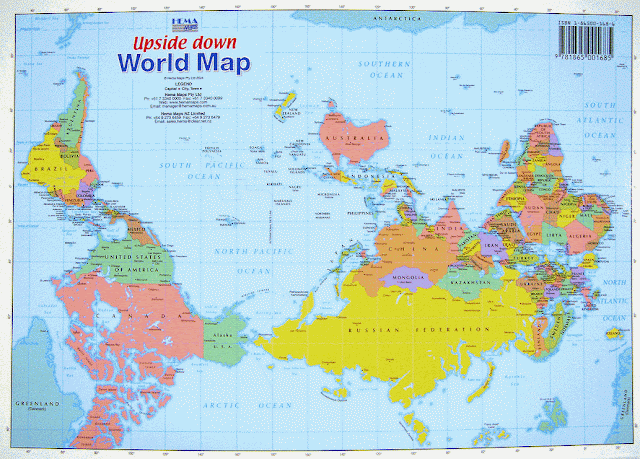March 28-- Tyler Young
March 30--Jennifer Byrd, Evonne Wong
April 4--Chloe Craig, Michael Fibersima, Kaitlyn Haupe
April 6--Hayden Hancock, Christopher McNally, William White
April 11--Kyla Carter, Michael Clark, Riho Kadono
April 13--Jared Frisk, Zach Karis, Je'mari Luper
April 18--Jade Braun, Haley McClung, Patrick McDonald
April 20--Trevor LeBlanc, Samatha Marcus, Jake Searock
Tuesday, March 28, 2017
Grading your presentations
2017 International
Name________________________________________
Country________________________________
10 points-- Include
country's brief history, population, religions, location, any
distinguishing characteristics of culture, and the media
1 2 3 4 5
30 points --WWWWH of media in that
country
1 2 3 4 5
25 points--Statistics on media
circulation, numbers of TV channels, newspapers, social media etc
1 2 3 4 5
25 points--Role of media, control of
media
1 2 3 4 5
5 points--Paper on time
25 points-- summary paper, with sources
listed at end handed to professor
5 points—1 page outline to all,
including professor
10 points—Visuals, map
5 points--Time:
10 points—Overall presentation
Wednesday, March 22, 2017
March 23 class canceled
Class won't meet tomorrow.
Except two students arrive on time to make up midterm.
Presentations begin Tuesday: Jennifer Byrd, Evonne Wong, Emily Palmer
Except two students arrive on time to make up midterm.
Presentations begin Tuesday: Jennifer Byrd, Evonne Wong, Emily Palmer
Tuesday, March 21, 2017
What is "political correctness"?
Political correctness is increasingly in the news in America, Canada, and in "free speech" countries around the world, especially at universities. What do you think?
Research today, and comment below by the end of the day. Two sources per question--list them.
1. What is political correctness?
2. Is political correctness harming the freedoms of the First Amendment?
3. How and/or why or why not?
4. Do you see political correctness at UCO? Be specfic with examples
5. Should anything, or can anything, be done about it? How and why?
Plut your answers in my folder on the computer.
Research today, and comment below by the end of the day. Two sources per question--list them.
1. What is political correctness?
2. Is political correctness harming the freedoms of the First Amendment?
3. How and/or why or why not?
4. Do you see political correctness at UCO? Be specfic with examples
5. Should anything, or can anything, be done about it? How and why?
Plut your answers in my folder on the computer.
Thursday, February 23, 2017
Why does George Orwell matter?
George Orwell
Cheat Sheet
The real George
Final warning
Why does George Orwell matter today in international media? Comment below by 5 pm Monday.
Midterm test, calendar
Contact with country, Feb. 28 or March 7
No class--March 2
Scheduling presentations--March 7
Midterm test--March 9
Press theories; Gutenberg; wire services; CNN; Orwell; Murdoch; war correspondents; CPR; dangerous countries
Presentations start --March 23
No class--April 27
No class--March 2
Scheduling presentations--March 7
Midterm test--March 9
Press theories; Gutenberg; wire services; CNN; Orwell; Murdoch; war correspondents; CPR; dangerous countries
Presentations start --March 23
No class--April 27
Tuesday, February 21, 2017
Which way is "up"? What does this effect?
Which way is up?
From space, there is no up. Why do we view the world the way we do? Does this effect our attitudes and behavior?
Why do we say something "Went South?" What does that imply?
Why do Americans distrust the media? Is it Trump?
Why do Americans distrust the media?
(Read, discuss in groups. Why is this? Is there a danger in this view? If so why? What can be done about it? Is it hopeless?)
Trust in Mass Media Returns to All-Time Low
Six-percentage-point drops in trust among Democrats and Republicans
by Justin McCarthy
WASHINGTON, D.C. -- After registering slightly higher trust last year,
Americans' confidence in the media's ability to report "the news fully,
accurately, and fairly" has returned to its previous all-time low of
40%. Americans' trust in mass media has generally been edging downward
from higher levels in the late 1990s and the early 2000s.
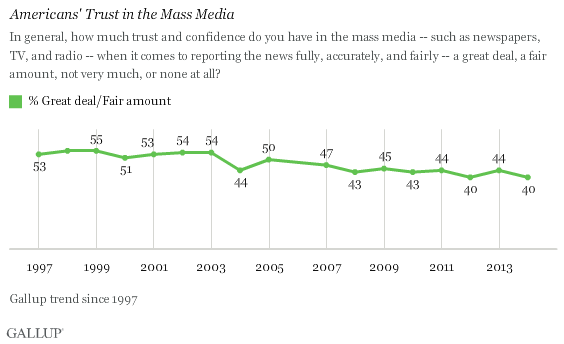
Prior to 2004, Americans placed more trust in mass media than they do
now, with slim majorities saying they had a "great deal" or "fair
amount" of trust. But over the course of former President George W.
Bush's re-election season, the level of trust fell significantly, from
54% in 2003 to 44% in 2004. Although trust levels rebounded to 50% in
2005, they have failed to reach a full majority since.
Americans' trust in the media in recent years has dropped slightly in
election years, including 2008, 2010, 2012, and again this year -- only
to edge its way back up again in the following odd-numbered years.
Although the differences between the drops and the recoveries are not
large, they suggest that something about national elections triggers
skepticism about the accuracy of the news media's reporting.
Among Democrats, Trust in Media at a 14-Year Low
Trust among Democrats, who have traditionally expressed much higher
levels of confidence in the media than Republicans have, dropped to a
14-year low of 54% in 2014. Republicans' trust in the media is at 27%,
one percentage point above their all-time low, while independents held
steady at 38% -- up one point from 37% in 2013.
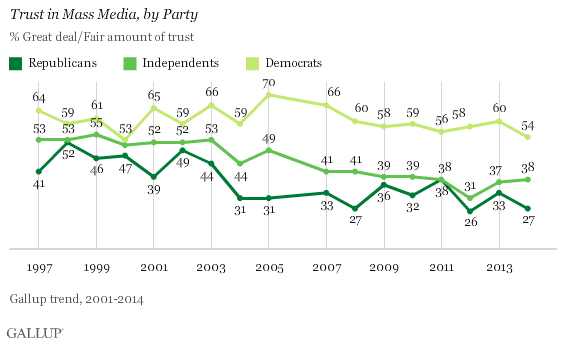
Sharp Uptick in Americans Who Think News Media Are "Too Conservative"
As has been the case historically, Americans are most likely to feel the
news media are "too liberal" (44%) rather than "too conservative,"
though this perceived liberal bias is now on the lower side of the
trend. One in three (34%) say the media are "just about right" in terms
of their coverage -- down slightly from 37% last year.
Nearly one in five Americans (19%) say the media are too conservative,
which is still relatively low, but the highest such percentage since
2006. This is up six points from 2013 -- the sharpest increase in the
percentage of Americans who feel the news skews too far right since
Gallup began asking the question in 2001.
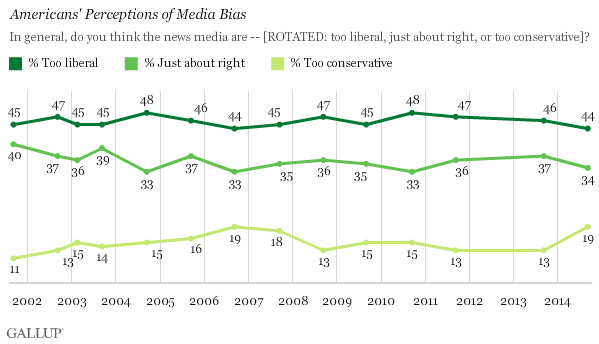
Conservatives (70%) are far more likely than liberals (15%) to perceive
the media as too liberal. Moderates' views are closer to liberals, with
35% calling the media too liberal. Likewise, relatively few moderates --
similar to conservatives -- think the media are too conservative.
Democrats -- with a small majority of 52% -- are most likely to think
the media are just about right, while a mere 18% of Republicans feel
this way about the news. More than seven in 10 Republicans say the media
are too liberal.
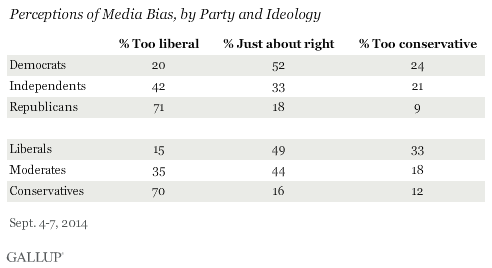
Bottom Line
Though a sizable percentage of Americans continue to have a great deal
or fair amount of trust in the media, Americans' overall trust in the
Fourth Estate continues to be significantly lower now than it was 10 to
15 years ago.
As the media expand into new domains of news reporting via social media
networks and new mobile technology, Americans may be growing
disenchanted with what they consider "mainstream" news as they seek out
their own personal veins of getting information. At the same time, confidence is down across many institutions, and a general lack in trust overall could be at play.
Americans' opinions about the media appear affected in election years,
however. Americans' trust in the media will likely recover slightly in
2015 with the absence of political campaigns. But the overarching
pattern of the past decade has shown few signs of slowing the decline of
faith in mass media as a whole.
Survey Methods
Results for
this Gallup poll are based on telephone interviews conducted Sept. 4-7,
2014, with a random sample of 1,017 adults, aged 18 and older, living in
all 50 U.S. states and the District of Columbia.
For results
based on the total sample of national adults, the margin of sampling
error is ±4 percentage points at the 95% confidence level.
Interviews
are conducted with respondents on landline telephones and cellular
phones, with interviews conducted in Spanish for respondents who are
primarily Spanish-speaking. Each sample of national adults includes a
minimum quota of 50% cellphone respondents and 50% landline respondents,
with additional minimum quotas by time zone within region. Landline and
cellular telephone numbers are selected using random-digit-dial
methods. Landline respondents are chosen at random within each household
on the basis of which member had the most recent birthday.
Samples are
weighted to correct for unequal selection probability, nonresponse, and
double coverage of landline and cell users in the two sampling frames.
They are also weighted to match the national demographics of gender,
age, race, Hispanic ethnicity, education, region, population density,
and phone status (cellphone only/landline only/both, and cellphone
mostly). Demographic weighting targets are based on the most recent
Current Population Survey figures for the aged 18 and older U.S.
population. Phone status targets are based on the most recent National
Health Interview Survey. Population density targets are based on the
most recent U.S. census. All reported margins of sampling error include
the computed design effects for weighting.
In addition
to sampling error, question wording and practical difficulties in
conducting surveys can introduce error or bias into the findings of
public opinion polls.
Thursday, February 16, 2017
Today's research day questions
1. Find facts about your country--population, political system languages, religions, races, culture, brief history-5 main points max with dates
2. Find facts about news media in your country--print-newspapers, magazines, broadcast-radio-tv, digital, other
4. Two online sources for each of above--with url and title
5. Find map on country, showing main cities
6. Create Word document listing all of this, with your name and date--email to self, and print copy for Clark
2. Find facts about news media in your country--print-newspapers, magazines, broadcast-radio-tv, digital, other
- Include stats on number of media, circulation, audience, followers
4. Two online sources for each of above--with url and title
5. Find map on country, showing main cities
6. Create Word document listing all of this, with your name and date--email to self, and print copy for Clark
Tuesday, February 14, 2017
Who is Rupert Murdock?
Murdoch
History
Why should you care? Read: Murdock/Trump; Today's Times: The struggle inside ; WSJ Editor defends
TV: Fox Broadcasting
Company, Fox News Channel, Fox Kids Channel, Fox Business Network, Fox
Classics, Fox Sports Net, FX, the National Geographic Channel, The Golf
Channel, TV Guide Channel
Radio: Fox Sports Radio Network
Books: HarperCollins (which publishes JRR Tolkien, CS Lewis, Lemony Snicket, JG Ballard, and Neil Gaiman)
Magazines: TV Guide, The Weekly Standard, Maximum Golf, Barron’s Magazine
Newspapers: The New
York Post, Wall Street Journal, The Times (UK), The Sun (UK), The Australian
(AU), The Herald Sun (AU), The Advertiser (AU)
Websites: Foxsports.com, Hulu (part ownership), Scout.com, The Daily
Film studios: 20th Century Fox (Avatar, The Simpsons, Star Wars, X-Men, Die Hard, Night at the Museum), Fox Searchlight (Slumdog Millionaire, Juno, 127 Hours, Black Swan, Little Miss Sunshine)
Sports (part ownership): Los Angeles Lakers, Colorado Rockies, Australia and New Zealand’s National Rugby League
History
Why should you care? Read: Murdock/Trump; Today's Times: The struggle inside ; WSJ Editor defends
In 1986, keen to adopt newer electronic
publishing technologies, he consolidated his UK printing operations in east London, causing bitter industrial disputes.
His News Corporation acquired Twentieth Century Fox (1985), HarperCollins (1989), The Wall Street
Journal (2007), National
Geographic (2015). He formed the British broadcaster BSkyB
in 1990, and during the 1990s expanded into Asian networks and South American
television.
By 2000, Murdoch's News Corporation owned over 800 companies in
more than 50 countries with a net worth of over $5 billion.
He owns:
Radio: Fox Sports Radio Network
Books: HarperCollins (which publishes JRR Tolkien, CS Lewis, Lemony Snicket, JG Ballard, and Neil Gaiman)
Magazines: TV Guide, The Weekly Standard, Maximum Golf, Barron’s Magazine
Websites: Foxsports.com, Hulu (part ownership), Scout.com, The Daily
Film studios: 20th Century Fox (Avatar, The Simpsons, Star Wars, X-Men, Die Hard, Night at the Museum), Fox Searchlight (Slumdog Millionaire, Juno, 127 Hours, Black Swan, Little Miss Sunshine)
Sports (part ownership): Los Angeles Lakers, Colorado Rockies, Australia and New Zealand’s National Rugby League
War correspondents--why?
Do you know who Ernie Pyle was?
D-Day
Who was Edward R. Murrow?
War Correspondent
Comment below, by 5 pm, Monday, Feb. 27,
1. One paragraph: Why do you think anyone would want to be an international journalist today?
2. One paragraph: Comment on what makes Pyle's writing and Murrow's narration so effective?
D-Day
NORMANDY BEACHHEAD, June 16, 1944 – I took a walk along the historic coast of Normandy in the country of France.
It was a lovely day for strolling along the seashore. Men were sleeping on the sand, some of them sleeping forever.
Men were floating in the water, but they didn’t know they were in the water, for they were dead.
The water
was full of squishy little jellyfish about the size of your hand.
Millions of them. In the center each of them had a green design exactly
like a four-leaf clover. The good-luck emblem. Sure. Hell yes.
I walked for a mile and a half along the water’s edge of our many-miled invasion beach.
You wanted to walk slowly, for the detail on that beach was infinite.
The wreckage
was vast and startling. The awful waste and destruction of war, even
aside from the loss of human life, has always been one of its
outstanding features to those who are in it. Anything and everything is
expendable.
And we did expend on our beachhead in Normandy during those first few hours.
•
For a mile
out from the beach there were scores of tanks and trucks and boats that
you could no longer see, for they were at the bottom of the water –
swamped by overloading, or hit by shells, or sunk by mines. Most of
their crews were lost.
You could
see trucks tipped half over and swamped. You could see partly sunken
barges, and the angled-up corners of jeeps, and small landing craft half
submerged. And at low tide you could still see those vicious
six-pronged iron snares that helped snag and wreck them.
On the beach
itself, high and dry, were all kinds of wrecked vehicles. There were
tanks that had only just made the beach before being knocked out. There
were jeeps that had been burned to a dull gray. There were big derricks
on caterpillar treads that didn’t quite make it. There were half-tracks
carrying office equipment that had been made into a shambles by a single
shell hit, their interiors still holding their useless equipage of
smashed typewriters, telephones, office files.
There were
LCT’s (landing craft tanks) turned completely upside down, and lying on
their backs, and how they got that way I don’t know. There were boats
stacked on top of each other, their sides caved in, their suspension
doors knocked off.
In this
shoreline museum of carnage, there were abandoned rolls of barbed wire
and smashed bulldozers and big stacks of thrown-away lifebelts and piles
of shells still waiting to be moved.
In the water floated empty life rafts and soldiers’ packs and ration boxes, and mysterious oranges.
On the beach lay snarled rolls of telephone wire and big rolls of steel matting and stacks of broken, rusting rifles.
On the beach
lay, expended, sufficient men and mechanism for a small war. They were
gone forever now. And yet we could afford it.
We could
afford it because we were on, we had our toehold, and behind us there
were such enormous replacements for this wreckage on the beach that you
could hardly conceive of their sum total. Men and equipment were flowing
from England in such a gigantic stream that it made the waste on the
beachhead seem like nothing at all, really nothing at all.
•
A few
hundred yards back on the beach is a high bluff. Up there we had a tent
hospital, and a barbed-wire enclosure for prisoners of war. From up
there you could see far up and down the beach, in a spectacular
crow’s-nest view, and far out to sea.
And standing
out there on the water beyond all this wreckage was the greatest armada
man has ever seen. You simply could not believe the gigantic collection
of ships that lay out there waiting to unload.
Looking from
the bluff, it lay thick and clear to the far horizon of the sea and
beyond, and it spread out to the sides and was miles wide. Its utter
enormity would move the hardest man.
As I stood
up there I noticed a group of freshly taken German prisoners standing
nearby. They had not yet been put in the prison cage. They were just
standing there, a couple of doughboys leisurely guarding them with tommy
guns.
The
prisoners too were looking out to sea – the same bit of sea that for
months and years had been so safely empty before their gaze. Now they
stood staring almost as if in a trance.
They didn’t
say a word to each other. They didn’t need to. The expression on their
faces was something forever unforgettable. In it was the final horrified
acceptance of their doom.
If only all
Germans could have had the rich experience of standing on the bluff and
looking out across the water and seeing what their compatriots saw.
War CorrespondentWho was Edward R. Murrow?
War Correspondent
Comment below, by 5 pm, Monday, Feb. 27,
1. One paragraph: Why do you think anyone would want to be an international journalist today?
2. One paragraph: Comment on what makes Pyle's writing and Murrow's narration so effective?
Thursday, February 2, 2017
News story assignment
Next week--our special guest, Mahir Zeynelov of Turkey--be here on time or don't come in.
You will take notes and write a 150-word news story, typed to hand in on Thursday, Feb, 9.
You will take notes and write a 150-word news story, typed to hand in on Thursday, Feb, 9.
Thursday, January 26, 2017
Where do you get your news?
"Wire" services--international news
- Associated Press--1848
- United Press International--1907-58
- AFP—Agence France-Presse--1835
- Reuters--1851
- TASS--1925
- BBC-- 1922
- CNN--1980
- Al Jazeera--1996
- Zenit--1997
- twitter--2006
- Vice--2013
Tuesday, January 24, 2017
Country adoption preliminary deadlines
We will begin your
country adoption reports Thursday, March 23 and have two or three a day.
Date assignments will be made March 9.
- By Thursday, Feb. 9, post below the person and media you will contact.
- By Tuesday, Feb. 16, you will have made contact by email with a media person in your country. We will discuss this in class.
- In initial email, introduce yourself; tell the person who you are and that you're doing this for a university class; and give the link to Clarkinternational as a reference.
- Ask for a confirmation email.
- Let them know you need to visit with them, via email, no later than March 9.
- Ask them for a date when they'd have time to respond.
- If the person does not respond within 24 hours, send another email. If that doesn't work, find a backup person immediately.
- Being unable to contact a media person will subtract 30 points from your 150-point project.
- Send them the list of questions you'd to discuss:
- What is the roll of the media in their country?
- How has the Internet and social media changed media in their country?
- What is the most important thing to know about media in their country?
- Who controls the media in their country?
- What are the strengths of the media in their country?
- What are the weaknesses of the media in their country?
In your email, I
suggest some form of the following:
I'm a senior (major) student at the University of Central Oklahoma in an international media class.
For my class assignment, I'm studying the media in your country and would appreciate it if you could answer a few questions for me.
Your views on the news media will be vital to my class presentation later this semester. The questions I'd like to ask follow. Would it be possible to have your answers by (date)?
I'm a senior (major) student at the University of Central Oklahoma in an international media class.
For my class assignment, I'm studying the media in your country and would appreciate it if you could answer a few questions for me.
Your views on the news media will be vital to my class presentation later this semester. The questions I'd like to ask follow. Would it be possible to have your answers by (date)?
Thursday, January 19, 2017
Libertarian thought
"Congress shall make no law respecting an establishment of religion, or
prohibiting the free exercise thereof; or abridging the freedom of
speech, or of the press; or the right of the people peaceably to
assemble, and to petition the Government for a redress of grievances."
Questions for today on censorship
1. Should "fake news" be censored? Fake News masterpiece
2. Should "apps" be censored? Censors Delight
3. Is the First Amendment obsolete?
4. Why? Why? Why?
3 tables, 15 read, 15 discuss, 15 report
2. Should "apps" be censored? Censors Delight
3. Is the First Amendment obsolete?
4. Why? Why? Why?
3 tables, 15 read, 15 discuss, 15 report
Tuesday, January 17, 2017
Dangerous year for journalists--Authoritarian Assignment
The Committee to Protect Journalists. Click on this link.
Comment below, by 5 pm WednesdayJan. 18.
Why is Turkey so dangerous for journalists?
Can this happen in the United States? Why or why not?
Why is Turkey so dangerous for journalists?
Thursday, January 12, 2017
Second reading assignments
Click and read. Or on pages A8, B5, of today's New York Times
Norway cuts FM radio
Facebook Journalism Project
Comment below by 5 p.m. Friday
1. What effect would that have, if done to FM in America?
2. Will Facebook's action increase or decrease more "fake news"
Norway cuts FM radio
Facebook Journalism Project
Comment below by 5 p.m. Friday
1. What effect would that have, if done to FM in America?
2. Will Facebook's action increase or decrease more "fake news"
Wednesday, January 11, 2017
Four questions
"Four Theories of the Press," 1956.
Three professors of communication-Fred S. Siebert, Theodore Peterson and Wilbur Schramm-brought out their Four Theories of the Press which went a long way in establishing a typology in the minds of journalism educators and students.
Day 2 Agenda
Fact sheets
New York Times
· Country choices
· Comments, discussions
· blog
· Clare Hollingworth assignment
MidEast assignment
· Mideast map
Four questions
Four questions
It's time to get to work
- Watch this video:Isis and social media
-
Assignment--what is Al Jazeera, and why should you know about it? https://en.m.wikipedia.org/wiki/Al_JazeeraComment below by 5 p.m. Jan. 13.
- Mideast map--learn countries by Tuesday

Subscribe to:
Comments (Atom)

